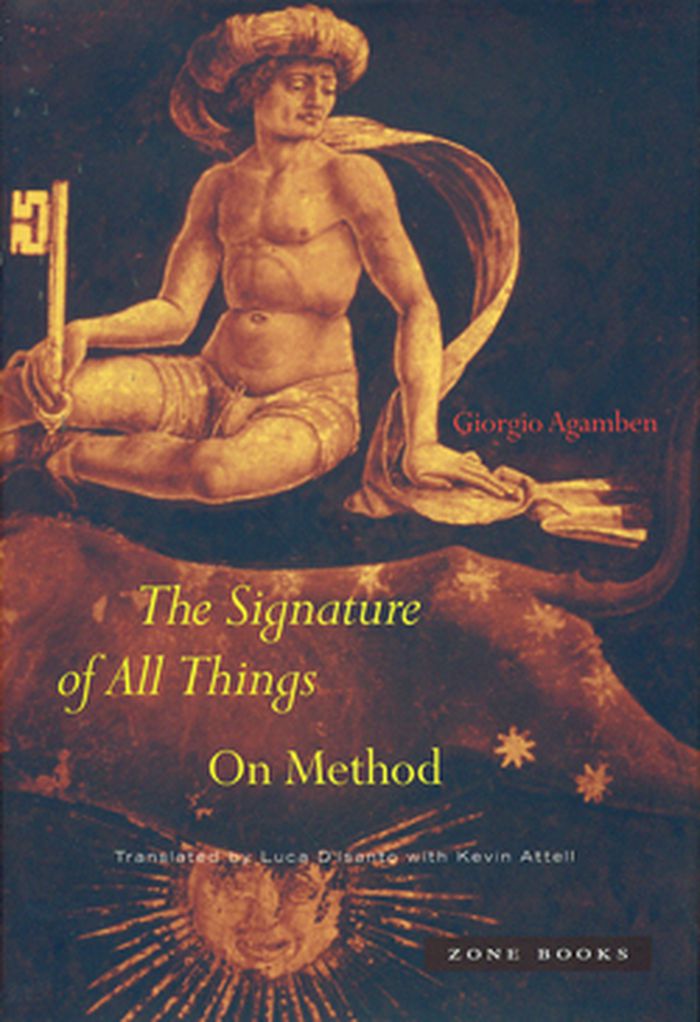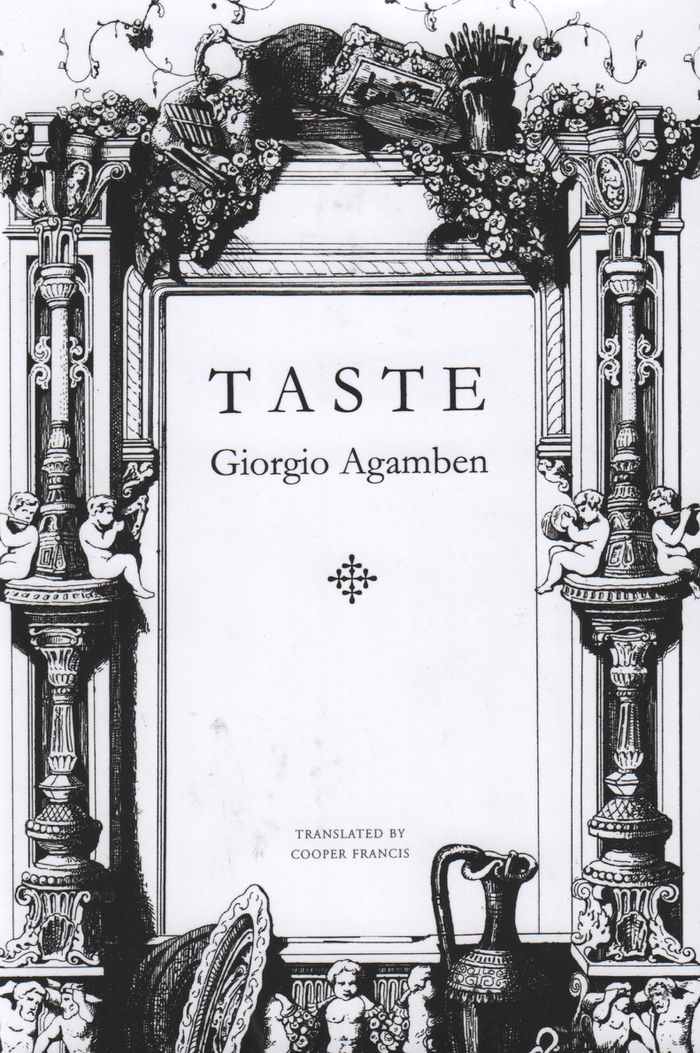The adventure
$17.00
(disponible sur commande)
Résumé:
An ancient legend identifies Demon, Chance, Love, and Necessity as the four gods who preside over the birth of every human being. We must all pay tribute to these deities and should not try to elude or dupe them. To accept them, Giorgio Agamben suggests, is to live one’s life as an adventure—not in the trivial sense of the term, with lightness and disenchantment, but with(...)
The adventure
Actions:
Prix:
$17.00
(disponible sur commande)
Résumé:
An ancient legend identifies Demon, Chance, Love, and Necessity as the four gods who preside over the birth of every human being. We must all pay tribute to these deities and should not try to elude or dupe them. To accept them, Giorgio Agamben suggests, is to live one’s life as an adventure—not in the trivial sense of the term, with lightness and disenchantment, but with the understanding that adventure, as a specific way of being, is the most profound experience in our human existence. In this pithy, poetic, and compelling book, Agamben maps a journey from poems of chivalry to philosophy, from Yvain to Hegel, from Beatrice to Heidegger. The four gods of legend are joined at the end by a goddess, the most elusive and mysterious of all: Elpis, Hope. In Greek mythology, Hope remains in Pandora's box, not because it postpones its fulfillment to an invisible beyond but because somehow it has always been already satisfied. Here, Agamben presents Hope as the ultimate gift of the human adventure on Earth.
Théorie/ philosophie
The coming community
$19.50
(disponible sur commande)
Résumé:
In this extraordinary and original philosophical achievement, Agamben develops the concept of community and the social implications of his philosophical thought. Agamben's exploration is, in part, a contemporary response to the work of Heidegger, Wittgenstein, Blanchot, Jean-Luc Nancy, and, more historically, Plato, Spinoza, and medieval scholars and theorists of(...)
The coming community
Actions:
Prix:
$19.50
(disponible sur commande)
Résumé:
In this extraordinary and original philosophical achievement, Agamben develops the concept of community and the social implications of his philosophical thought. Agamben's exploration is, in part, a contemporary response to the work of Heidegger, Wittgenstein, Blanchot, Jean-Luc Nancy, and, more historically, Plato, Spinoza, and medieval scholars and theorists of Judeo-Christian scriptures.
Théorie/ philosophie
What is philosophy?
$24.95
(disponible sur commande)
Résumé:
In attempting to answer the question posed by this book's title, Giorgio Agamben does not address the idea of philosophy itself. Rather, he turns to the apparently most insignificant of its components: the phonemes, letters, syllables, and words that come together to make up the phrases and ideas of philosophical discourse. A summa, of sorts, of Agamben's thought, the(...)
What is philosophy?
Actions:
Prix:
$24.95
(disponible sur commande)
Résumé:
In attempting to answer the question posed by this book's title, Giorgio Agamben does not address the idea of philosophy itself. Rather, he turns to the apparently most insignificant of its components: the phonemes, letters, syllables, and words that come together to make up the phrases and ideas of philosophical discourse. A summa, of sorts, of Agamben's thought, the book consists of five essays on five emblematic topics: the Voice, the Sayable, the Demand, the Proem, and the Muse. In keeping with the author's trademark methodology, each essay weaves together archaeological and theoretical investigations: to a patient reconstruction of how the concept of language was invented there corresponds an attempt to restore thought to its place within the voice; to an unusual interpretation of the Platonic Idea corresponds a lucid analysis of the relationship between philosophy and science, and of the crisis that both are undergoing today.
Théorie/ philosophie
$27.99
(disponible sur commande)
Résumé:
Three conceptual figures organize Agamben's argument and the advent of his new method: the paradigm, the signature, and archaeology. Each chapter is devoted to an investigation of one of these concepts and Agamben carefully constructs its genealogy transhistorically and from an interdisciplinary perspective. And at each moment of the text, Agamben pays tribute to Michel(...)
The signature of all things: on method
Actions:
Prix:
$27.99
(disponible sur commande)
Résumé:
Three conceptual figures organize Agamben's argument and the advent of his new method: the paradigm, the signature, and archaeology. Each chapter is devoted to an investigation of one of these concepts and Agamben carefully constructs its genealogy transhistorically and from an interdisciplinary perspective. And at each moment of the text, Agamben pays tribute to Michel Foucault, whose methods he rethinks and effectively uses to reformulate the logic of the concepts he isolates.
Théorie/ philosophie
$9.95
(disponible sur commande)
Résumé:
J’appelle dispositif tout ce qui a, d’une manière ou d’une autre, la capacité de capturer, d’orienter, de déterminer, d’intercepter, de modeler, de contrôler et d’assurer les gestes, les conduites, les opinions et les discours des êtres vivants. Giorgio Agamben Les dispositifs où se jouent désormais nos existences – du téléphone portable à la télévision, de(...)
Giorgio Agamben : qu'est-ce qu'un dispositif?
Actions:
Prix:
$9.95
(disponible sur commande)
Résumé:
J’appelle dispositif tout ce qui a, d’une manière ou d’une autre, la capacité de capturer, d’orienter, de déterminer, d’intercepter, de modeler, de contrôler et d’assurer les gestes, les conduites, les opinions et les discours des êtres vivants. Giorgio Agamben Les dispositifs où se jouent désormais nos existences – du téléphone portable à la télévision, de l’ordinateur à l’automobile – ne se trouvent pas face à l’homme comme de simples objets de consommation. Ils transforment nos personnalités. La question devient alors : quelle stratégie devons-nous adopter dans le corps à corps quotidien qui nous lie aux dispositifs ?
Épistémologie et réseau
$29.95
(disponible sur commande)
Résumé:
What can the senses of an attentive philosopher see, hear, and learn that can, in turn, teach us about living better lives? Perhaps it’s less a matter of asking what and more a matter of asking how. These latest reflections from Italy’s foremost philosopher form a sort of travelogue that chronicles Giorgio Agamben’s profound interior journey. Here, with unprecedented(...)
What I saw, heard, learned...
Actions:
Prix:
$29.95
(disponible sur commande)
Résumé:
What can the senses of an attentive philosopher see, hear, and learn that can, in turn, teach us about living better lives? Perhaps it’s less a matter of asking what and more a matter of asking how. These latest reflections from Italy’s foremost philosopher form a sort of travelogue that chronicles Giorgio Agamben’s profound interior journey. Here, with unprecedented immediacy, Agamben shares his final remarks, late-life observations, and reflections about his life that flashed before his eyes. What did he see in that brief flash? What did he stay faithful to? What remains of all those places, friends, and teachers?
Théorie/ philosophie
Taste
$28.50
(disponible sur commande)
Résumé:
Our taste buds are a powerful way for humans to know beauty and experience beautiful things. In Taste, Italian philosopher Giorgio Agamben takes a close look at why the sense of taste has not historically been appreciated as a means to know and experience pleasure or why it has always been considered inferior to actual theoretical knowledge.
Taste
Actions:
Prix:
$28.50
(disponible sur commande)
Résumé:
Our taste buds are a powerful way for humans to know beauty and experience beautiful things. In Taste, Italian philosopher Giorgio Agamben takes a close look at why the sense of taste has not historically been appreciated as a means to know and experience pleasure or why it has always been considered inferior to actual theoretical knowledge.
Théorie de l’art
livres
$9.95
(disponible sur commande)
Résumé:
Contemporain est celui qui reçoit en plein visage le faisceau de ténèbres qui provient de son temps.
Qu'est ce que le contemporain
Actions:
Prix:
$9.95
(disponible sur commande)
Résumé:
Contemporain est celui qui reçoit en plein visage le faisceau de ténèbres qui provient de son temps.
livres
juin 2008
Théorie/ philosophie
Profanations
$25.95
(disponible sur commande)
Résumé:
The Italian philosopher Giorgio Agamben has always been an original reader of texts, understanding their many rich and multiple historical, aesthetic, and political meanings and effects. In "Profanations", Agamben has assembled for the first time some of his most pivotal essays on photography, the novel, and film.
Profanations
Actions:
Prix:
$25.95
(disponible sur commande)
Résumé:
The Italian philosopher Giorgio Agamben has always been an original reader of texts, understanding their many rich and multiple historical, aesthetic, and political meanings and effects. In "Profanations", Agamben has assembled for the first time some of his most pivotal essays on photography, the novel, and film.
Théorie/ philosophie
livres
Qu'est-ce qu'un dispositif?
$9.95
(disponible sur commande)
Résumé:
Le dispositif nomme un ensemble de praxis, de savoirs, de mesures, d'institutions dont le but est de gérer, de gouverner, de contrôler et d'orienter, en un sens qui se veut utile, les comportements, les gestes et les pensées des hommes. Nous sommes pris dans des dispositifs : nous nous transportons, nous nous parlons, nous nous rapportons à nous-mêmes à travers des(...)
Qu'est-ce qu'un dispositif?
Actions:
Prix:
$9.95
(disponible sur commande)
Résumé:
Le dispositif nomme un ensemble de praxis, de savoirs, de mesures, d'institutions dont le but est de gérer, de gouverner, de contrôler et d'orienter, en un sens qui se veut utile, les comportements, les gestes et les pensées des hommes. Nous sommes pris dans des dispositifs : nous nous transportons, nous nous parlons, nous nous rapportons à nous-mêmes à travers des dispositifs. Nous appartenons aux dispositifs tout autant qu'ils font partie de nos vies. Mais qu'est-ce qu'un dispositif et comment situer l'analyse qui pourrait nous en délivrer ? Dans ce texte bref et incisif, Giorgio Agamben ne se contente pas de poser la question mais explique comment elle s'est posée à lui. On peut lire son essai comme une leçon de méthode, comme une analyse de notre société, comme une nouvelle orientation pour fonder l'anthropologie.
livres
octobre 2014
Théorie/ philosophie







